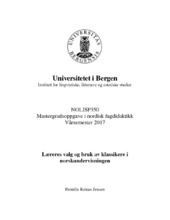| dc.contributor.author | Jensen, Pernille Reitan | |
| dc.date.accessioned | 2017-09-06T06:40:52Z | |
| dc.date.available | 2017-09-06T06:40:52Z | |
| dc.date.issued | 2017-06-16 | |
| dc.date.submitted | 2017-06-15T22:00:08Z | |
| dc.identifier.uri | https://hdl.handle.net/1956/16572 | |
| dc.description.abstract | Sammendrag Denne masteroppgaven undersøker læreres valg og bruk av norske klassikere i norskundervisningen. Oppgaven er rettet mot videregående skole, og målet er å belyse hvordan lærere velger ut og jobber med de klassiske verkene i skolen. For å finne ut av dette vil jeg jobbe med følgende forskningsspørsmål: Hvilke begrunnelser legger lærerne til grunn for klassikerutvalget? Hva mener lærerne elevene kan få ut av arbeidet med akkurat disse klassikerne? Hvordan arbeides det med litteraturen i klasserommet? Hvilke utfordringer står lærerne overfor når det undervises i klassisk litteratur? Undersøkelsens metode er en kvalitativ studie med semistrukturerte intervju. Metoden som er benyttet under intervjuene kalles photo elicitation, fremlokking ved bilder på norsk. Empirien består av dybdeintervju med fire norsklærere fra fire ulike videregående skoler i Hordaland fylke. Intervjuene er tatt opp på lydbånd og transkribert. Datamaterialet viser at det er nokså samsvar mellom lærernes kriterier for utvelgelse av de klassiske tekstene, men stor variasjon i arbeidet med tekstene. Gjennom arbeidet med forskningsspørsmålene har det blitt vist at valg av litteratur ofte begrunnes i en målrettet tanke mot eksamen hvor lærerne velger litteratur sensor vil være tilfreds med; et såkalt washback-fenomen. Andre utvelgelseskriterier er praktiske årsaker som tilgjengelighet og tidsbruk, og at tekstene representerer en litterær epoke godt. Lærerne begrunner bruk av klassiske tekster med at elevene skal få innblikk i våre kulturelle referanserammer og et innblikk i allmenne problemstillinger. Dette er momenter man også kan finne igjen i den pågående kanondebatten og i skolens danningsaspekt. Datamaterialet har og vist at bruken av klassikere varierer. Lærere som overlater definisjonsmakten av utvalget til lærebøker eller tilhørende antologier, ser i større grad ut til å bruke utdrag i stedet for hele verk. Et viktig moment å trekke frem når det gjelder resultatene er lærernes autonomi under Læreplanen i Kunnskapsløftet (LK06). Læreplanen gir en dobbelthet når det gjelder lærerautonomien. På den ene siden gir åpne læreplanmål lærerne stor frihet til å velge metoder og undervisningsstoff selv, på den andre siden er test- og kontrollregimet mer til stede enn noen sinne. Arbeidet i klasserommet skal evalueres og kunnskapen eleven sitter igjen med skal være vurderbar, noe som styrer utvalget av tekster og arbeidet med disse i stor grad. | en_US |
| dc.description.abstract | Abstract This master thesis explores teachers’ choice and use of Norwegian literary classics when teaching in the Norwegian subject. The thesis is focused on the Upper Secondary School level, and aims to examine how teachers choose and work with literary classics in the classroom. To examine these processes, I chose to formulate these research questions: Which reasons are given by teachers for their choice of literary works? What do teachers expect their students to learn from working specifically with the literary works they’ve chosen? How are the literary works used in the classroom? Which challenges may teachers face when teaching canonical literature? The method of examination is a qualitative study based on semi-structured interviews. Photo elicitation is the method used during the interviews. The empirical evidence is collected through in-depth interviews with four teachers of the Norwegian subject working at four different Upper Secondary Schools in Hordaland. The interviews have been audio recorded and transcribed. The data material shows that there is moderate conformity between the criteria set by the teachers for selection of canonical texts, but a wide variety within the methodology of working with said texts. Through work with the research questions, it’s become evident that the choice of literary works is often justified by targeting the end of the year exam, thus the teachers choose literature they think will fulfil the expectations of an external examiner; a so-called washback effect. Other selection criteria often consist of practical limitations such as accessibility and time allotted, and that the text represents a literary period well. The teachers justify their use of canonical literary texts by arguing that the students will gain insight into Norwegian cultural and community references and common issues. These are arguments we might also find in the ongoing debate around canonical status and the bildung aspect to the educational system. Furthermore, the data material has also shown that the use of Norwegian canonical literature varies. Teachers who allow the power of definition and selection of texts to students’ textbooks or accompanying literary anthologies are seemingly more inclined to use extracts instead of full texts. This is rather important when we consider the autonomy given to teachers in the Norwegian Subject Curriculum (LK06). The curriculum is ambiguous in what it states about autonomy for the teachers. On one hand, the vague and open competence aims allow teachers freedom of choice in methods and material. On the other, the current test and control regime is more present than ever. The learning occurring in the classroom is to be evaluated and assessed, and the knowledge the student has acquired is to be assessable. This, in turn, and in a significant degree, guides how teachers choose their literary texts and methods used when working with these. | en_US |
| dc.language.iso | nob | eng |
| dc.publisher | The University of Bergen | eng |
| dc.subject | Norskfaget | |
| dc.subject | Undervisning | |
| dc.subject | Norsk litteratur | |
| dc.subject | Videregående opplæring | |
| dc.title | Læreres valg og bruk av klassikere i norskundervisningen | eng |
| dc.type | Master thesis | |
| dc.date.updated | 2017-06-15T22:00:08Z | |
| dc.rights.holder | Copyright the author. All rights reserved | eng |
| dc.description.degree | Mastergradsoppgave i nordisk | |
| dc.description.localcode | NOLISP350 | |
| dc.subject.nus | 711123 | eng |
| fs.subjectcode | NOLISP350 | |
| fs.unitcode | 11-21-00 | |
